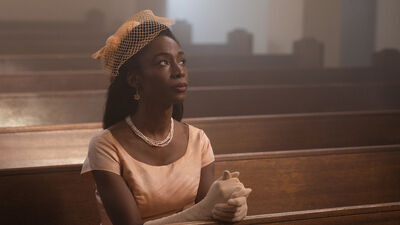What makes Chase Joynt’s first solo outing as a feature director, “Framing Agnes,” such essential viewing is the extent to which it sheds new light on the legacy of trans Americans from the past century and beyond, whose voices are only just beginning to emerge from the vault of obscurity. Based on Joynt and sociologist Kristen Schilt’s 2019 documentary short of the same name, this picture spawns from an astonishing discovery the pair made in the UCLA Gender Archives. Prying open a long-neglected drawer led them to find the entirety of case files detailing the life of a trans woman named Agnes, who claimed in the 1950s to be intersex to receive the gender-affirming surgery that she would otherwise have been deprived of. Agnes’ triumphant effort in navigating a system designed to exclude her has made the woman a hero in the trans community.
Her story alone would be worthy of a feature film, as would those of five other trans people interviewed by Dr. Harold Garfinkel in the 1950s. But, instead, the transcripts of these conversations are staged by Joynt in the format of a black-and-white talk show, evoking how the media have framed transgender people for decades. In his director’s statement, Joynt says that he wanted to subvert the narrative of isolation that both the media and medicine have perpetuated in regard to the histories of trans people, alienating them from any communal support systems. “In reality, trans communities have been navigating and world-building together behind the scenes since before ‘trans’ was a thing,” he notes.
In the film, he openly voices his discomfort at being a white trans masculine man tasked with portraying these stories onscreen. Perhaps that is why he casts himself as Garfinkel while gathering a remarkable array of talent to breathe richly textured life into the transcripts. Zachary Drucker of “Transparent” fame takes on the role of Agnes; poet Max Wolf Valerio, author of the 2006 memoir, The Testosterone Files, plays Henry, who was born a girl in 1917; Angelia Ross (“Pose”) channels the soul of Georgia, a Black trans woman faced with far more obstacles than her white peers; “Dickinson” director Silas Howard inhabits the skin of trans man Denny; screen newcomer Stephen Ira captures the youthfulness of 15-year-old Jimmy, and Jen Richards (“Mrs. Fletcher”) is especially electrifying as she digs into the nuances of her real-life character Barbara’s pointed answers.
Sumber: www.rogerebert.com
 Skip to content
Skip to content






